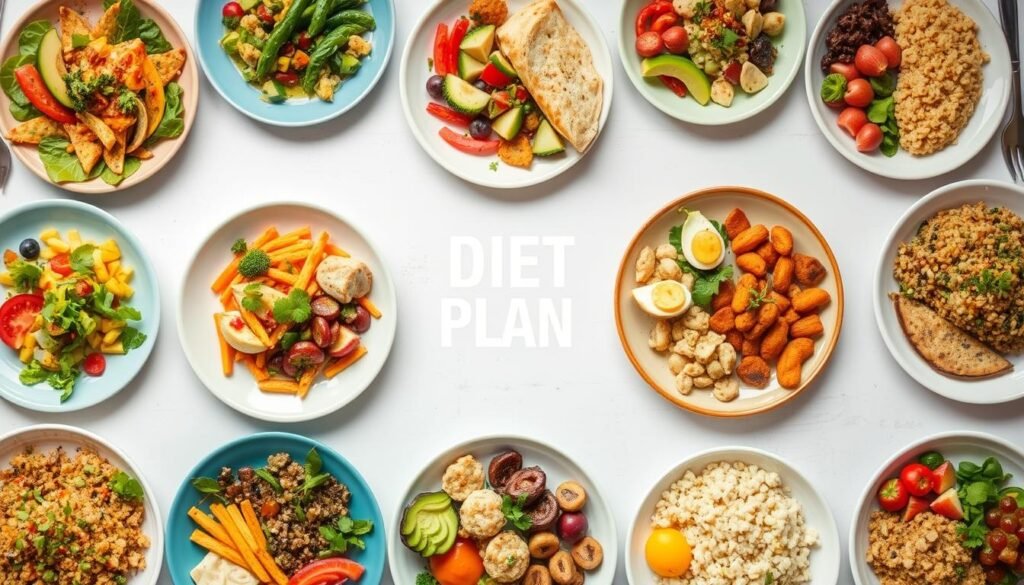Starting a weight loss journey can seem overwhelming. Yet, with the right approach and determination, you can reach your fitness goals and change your body. This guide offers 10 practical tips to help you achieve your weight loss goals and maintain a healthy lifestyle. Whether you want to lose a few pounds or undergo a full body transformation, these proven methods will help you succeed.
Key Takeaways
- Embrace a calorie deficit for sustainable weight loss
- Prioritize nutrient-dense, whole foods for a healthy diet
- Increase physical activity and exercise routinely
- Stay hydrated and drink plenty of water
- Develop a positive mindset and cultivate motivation
Embrace a Calorie Deficit for Sustainable Weight Loss
To achieve lasting weight loss, embracing a calorie deficit is essential. This means consuming fewer calories than your body burns each day. It allows you to shed excess pounds gradually without harming your health. By understanding the balance between calorie intake and expenditure, you can craft a sustainable weight loss plan that supports your fitness goals.
Understanding Calorie Intake and Expenditure
Your body’s calorie intake and expenditure determine your weight. Consuming more calories than needed leads to fat storage. On the other hand, burning more calories than consumed results in weight loss. By tracking your calorie intake and monitoring your activity, you can better understand your energy balance. This knowledge helps you make informed decisions to create a calorie deficit.
Creating a Moderate Calorie Deficit
The secret to successful and sustainable weight loss is a moderate calorie deficit, typically around 500 calories per day. This pace allows for a healthy weight loss of about 1-2 pounds per week. Avoid drastic calorie restrictions, as they can cause burnout, nutrient deficiencies, and slow your metabolism. This can undermine your long-term weight loss efforts.
Remember, a calorie deficit is just one part of the equation. Combine it with a nutrient-dense diet, regular exercise, and a positive mindset for lasting weight loss success.
“The key to sustainable weight loss is creating a moderate calorie deficit that supports gradual, healthy progress without compromising your overall well-being.”
Prioritize Nutrient-Dense, Whole Foods for a Healthy Diet
Fueling your body with nutrient-dense, whole foods is key for successful weight loss. Include a mix of fruits, vegetables, lean proteins, whole grains, and healthy fats in your diet. These nutrient-rich foods offer sustained energy and support your health, boosting your metabolism and aiding in fat burning.
For a healthy diet, focus on whole, minimally processed foods over refined ones. Choosing nutrient-dense options ensures a balanced nutrition that fuels your weight loss journey.
- Incorporate a variety of leafy greens, such as spinach, kale, and Swiss chard, which are packed with vitamins, minerals, and antioxidants.
- Choose whole grains, like quinoa, brown rice, and oats, which provide complex carbohydrates, fiber, and a slow release of energy.
- Opt for lean protein sources, such as chicken, turkey, fish, and legumes, to support muscle development and maintenance.
- Include healthy fats, like avocados, nuts, and olive oil, which are essential for hormone regulation and nutrient absorption.
- Explore fat-burning foods, such as green tea, ginger, and chili peppers, which may help boost your metabolism.
By making nutrient-dense, whole foods the core of your diet, you’ll support your weight loss goals. You’ll also nourish your body with the essential vitamins, minerals, and antioxidants it needs to thrive.
“Eating a healthy diet isn’t about deprivation, it’s about nourishing your body with the right foods to support your overall health and wellness.”
Increase Physical Activity and Exercise Routinely
Regular physical activity is crucial for successful weight loss. Combining cardiovascular exercises with strength training is key. This approach helps you achieve your weight loss goals and maintain a healthy weight for the long term.
Incorporating Cardiovascular Exercise
Cardiovascular exercises like brisk walking, jogging, swimming, or cycling are effective for burning calories. They increase your heart rate, leading to more calorie burn and enhanced fitness. These activities boost your physical activity levels significantly.
Strength Training for Muscle Preservation
Strength training is vital for preserving and building muscle mass. This supports your metabolism and aids in long-term weight management. Exercises targeting major muscle groups, such as resistance training or bodyweight exercises, are essential. They help maintain muscle while promoting fat loss.
| Exercise Routine | Benefits |
| Brisk Walking | Increases cardiovascular fitness, burns calories, and is low-impact |
| Strength Training | Preserves muscle mass, boosts metabolism, and supports weight management |
| Swimming | Provides a full-body workout, is low-impact, and can be enjoyable |
Consistency is crucial in exercise routines and physical activity. Aim to mix various activities in your weekly routine. This keeps your workouts engaging and effective.
Stay Hydrated and Drink Plenty of Water
Maintaining proper hydration is key to successful weight loss and healthy living. Water helps control hunger and boosts metabolism. It’s essential for bodily functions. Staying hydrated significantly aids in becoming fitter and healthier.
Experts suggest drinking at least eight 8-ounce glasses of water intake daily. Yet, your needs can differ based on activity, climate, and health. Listen to your body and drink more during exercise or in warm weather to stay hydrated.
Increasing water intake daily offers many benefits. It flushes toxins, aids digestion, and boosts metabolism. Consistent hydration improves energy, skin health, and aids in weight loss.
“Drinking enough water is one of the simplest and most effective ways to support your overall health and weight loss goals.”
Integrating water intake into your day is easy. Carry a reusable bottle, set reminders, or add fruit or herbs to your water. Prioritizing hydration will help you reach your weight loss and wellness goals.
Develop a Positive Mindset and Cultivate Motivation
Reaching lasting weight loss goes beyond just counting calories and exercising. It demands a positive mindset and consistent motivation. Setting realistic and attainable goals helps you stay focused and motivated. This approach prevents feelings of discouragement from unrealistic expectations.
Setting Realistic and Achievable Goals
Success hinges on setting goals that are specific, measurable, and attainable. Instead of focusing solely on the scale, aim for non-scale victories. These can include increased energy, better-fitting clothes, or enhanced mental clarity. This mindset shift keeps you motivated and celebrates your progress, even when the scale doesn’t change.
Celebrating Non-Scale Victories
Celebrating your non-scale victories is vital for a healthy positive mindset and motivation during your weight loss journey. Small wins, like fitting into old jeans or having more stamina in workouts, offer the mental support and accountability needed to stay on course.
Weight loss is a holistic journey, requiring physical, mental, and emotional changes. By fostering a positive mindset and surrounding yourself with support, you can reach your goals and sustain a lasting lifestyle change.
Implement Lifestyle Changes for Long-Term Success
Long-term weight loss isn’t about quick fixes or temporary changes. It demands a fundamental lifestyle and mindset shift. To achieve success, focus on building sustainable habits that you can maintain over time. This holistic approach, addressing both physical and mental health, is crucial for lasting success.
Begin by making small, manageable changes to your daily routine. Incorporate healthy meal planning, regular exercise, and mindful eating. These adjustments, though small, can significantly impact your health and weight management. Adopting a positive and proactive mindset helps you navigate the challenges of your weight loss journey.
Remember, sustainable weight loss isn’t about deprivation or drastic measures. It’s about finding a balance that suits you and making choices that support your long-term well-being. Celebrate every small victory and stay motivated by focusing on the positive changes in your lifestyle, healthy habits, and mindset.
“The secret of change is to focus all of your energy, not on fighting the old, but on building the new.” – Socrates
Start a journey of long-term sustainability and lifestyle changes that will transform your body and overall well-being. Embracing this holistic approach will guide you towards achieving and maintaining your weight loss goals for years.
The journey to lasting weight loss is a marathon, not a sprint. With patience, perseverance, and a commitment to sustainable habits, you can build a healthier, happier life that extends beyond the scale.
weight loss : 10 tips for successful
Starting a weight loss journey can be tough, but with the right strategies, you can reach your fitness goals. Here are 10 proven tips to help you succeed in your weight loss endeavor:
- Create a Calorie Deficit: Understand the balance between calories consumed and calories burned, and aim for a moderate calorie deficit to lose weight gradually and sustainably.
- Prioritize Nutrient-Dense Foods: Embrace a diet rich in whole, unprocessed foods that are packed with essential nutrients to fuel your body and support your metabolism.
- Increase Physical Activity: Incorporate a variety of cardiovascular exercises and strength training to boost your overall fitness and energy expenditure.
- Stay Hydrated: Drink plenty of water throughout the day to support your body’s natural functions and aid in weight loss.
- Cultivate a Positive Mindset: Set realistic goals, celebrate non-scale victories, and maintain motivation to stay on track with your weight loss journey.
By following these evidence-based tips, you can transform your body, boost your metabolism, and achieve your long-term fitness goals. Remember, sustainable weight loss is a journey, not a destination, so be patient, persistent, and enjoy the process.
| Tip | Description |
| Calorie Deficit | Understand the balance between calories consumed and calories burned, and aim for a moderate calorie deficit to lose weight gradually and sustainably. |
| Nutrient-Dense Foods | Embrace a diet rich in whole, unprocessed foods that are packed with essential nutrients to fuel your body and support your metabolism. |
| Physical Activity | Incorporate a variety of cardiovascular exercises and strength training to boost your overall fitness and energy expenditure. |
| Hydration | Drink plenty of water throughout the day to support your body’s natural functions and aid in weight loss. |
| Positive Mindset | Set realistic goals, celebrate non-scale victories, and maintain motivation to stay on track with your weight loss journey. |
Remember, sustainable weight loss is a journey, not a destination, so be patient, persistent, and enjoy the process.
Boost Your Metabolism with Healthy Habits
Boosting your metabolism is essential for effective weight loss. Healthy habits that enhance
metabolic function help burn calories, preserve muscle mass, and keep energy levels high. This is crucial for your weight loss journey.
Increasing Protein Intake
Boosting your metabolism starts with more protein intake. Opt for lean proteins like chicken, fish, and plant-based options. These not only aid in muscle building but also increase calorie burn due to digestion and processing needs. Ensure a balanced protein intake to keep your metabolism active.
Incorporating Metabolism-Boosting Foods
- Leafy greens: Rich in fiber, vitamins, and minerals, spinach and kale support metabolic function and fat-burning.
- Spices: Cayenne pepper and ginger stimulate thermogenesis, the body’s heat production, temporarily increasing metabolism.
- Whole grains: Complex carbs in quinoa and brown rice offer sustained energy and support metabolic health.
Adding these metabolism-boosting foods to your diet fuels fat burning and maintains energy levels during weight loss.
“Revving up your metabolism is a key factor in successful weight loss. Incorporate healthy habits that support metabolic function, such as increasing your protein intake and incorporating metabolism-boosting foods.”
Practice Portion Control and Mindful Eating
Long-term weight management begins with mastering portion control and mindful eating. It’s crucial to listen to your body’s hunger and fullness signals. This ensures a balanced calorie intake and prevents emotional eating.
Start with portion control. Use smaller plates, choose single-serving sizes, and be aware of your food portions. This approach helps you consume the right amount of nutrients and calories without feeling deprived or overeating.
Mindful eating means being fully present and engaged with your food. Take your time, enjoy each bite, and listen to your body. This develops a healthier food relationship and prevents mindless snacking or overeating. It leads to a more balanced nutrition plan.
- Serve meals on smaller plates to encourage appropriate portion sizes.
- Eat slowly and savor each bite, paying attention to your body’s hunger and fullness cues.
- Avoid distractions during meals, such as screens or multitasking, to stay mindful.
- Keep a food journal to track your calorie awareness and identify patterns in your eating habits.
- Opt for nutrient-dense, whole foods that provide lasting satiety and nourishment.
| Portion Control Tip | Mindful Eating Practice |
| Use smaller plates and bowls | Eat without distractions |
| Serve single-serving sizes | Chew food thoroughly |
| Pay attention to food labels | Pause between bites to assess hunger |
| Avoid second helpings | Savor the flavors and textures |
By adopting portion control and mindful eating practices, you can significantly advance towards your weight loss goals. This approach fosters a healthier, more sustainable food relationship.
“The key to successful weight loss is not just what you eat, but how you eat it.”
Consider Evidence-Based Diet Plans and Strategies
Creating a calorie deficit is key to losing weight. Yet, exploring evidence-based diet plans and strategies can offer extra support. Intermittent fasting, low-carb, and keto diets have become popular for their effectiveness. However, it’s important to choose a method that fits your lifestyle and preferences for long-term success.
Exploring Intermittent Fasting
Intermittent fasting involves alternating between eating and fasting periods to create a calorie deficit. It has been linked to improved insulin sensitivity, reduced inflammation, and weight loss. When done right, it can be a valuable tool in your weight loss journey.
Low-Carb or Keto Diets
Low-carb and keto diets are gaining popularity for weight loss. They involve cutting down on carbs and increasing healthy fats and proteins. This can lead to ketosis, where your body burns fat instead of carbs. Yet, it’s vital to ensure you’re getting all the nutrients you need and to consult a healthcare professional before starting.
Finding the right diet plan depends on your personal preferences, lifestyle, and health needs. Consult with a healthcare professional or registered dietitian to find the best approach for you. This ensures you make sustainable, evidence-based choices for your weight loss journey.
“The key to successful weight loss is finding a balanced, sustainable approach that works for you, rather than adopting a one-size-fits-all solution.”
Track Your Progress and Make Adjustments
Tracking your progress is essential in your weight loss journey. Regular monitoring keeps you motivated and allows for informed adjustments to your diet and exercise. A data-driven approach is crucial for long-term success.
Begin by tracking your weight, body measurements, and other non-scale indicators of progress. This includes improved energy levels or better-fitting clothes. Such data highlights your strengths and areas for improvement. Remember, the scale is just one indicator – celebrate your non-scale victories too.
| Metric | Baseline | Current | Change |
| Weight | 180 lbs | 165 lbs | -15 lbs |
| Waist Circumference | 36 inches | 32 inches | -4 inches |
| Energy Levels | Low | High | Improved |
With a clear view of your progress, be ready to adjust your diet and exercise routine as needed. This accountability keeps you on track and ensures continued results. Remember, weight loss is a journey, not a destination. Flexibility is key to long-term success.
“Tracking your progress is the key to unlocking your full potential. Stay motivated, stay accountable, and stay open to adjustments along the way.”
Conclusion
Embarking on a journey to successful and sustainable weight loss demands a holistic approach. This includes focusing on both your physical and mental health. By following the 10 tips in this guide, you can create a calorie deficit and adopt a healthy diet. Additionally, increasing physical activity and cultivating positive lifestyle habits will support your long-term fitness goals.
Adopting this comprehensive strategy empowers you to transform your body and achieve your desired fitness level. Remember, weight loss is more than just a number on the scale. It’s about building a healthy lifestyle that benefits both your body and mind. Stay committed, celebrate your non-scale victories, and embrace the transformative power of this journey.
With the right mindset, nutrition, and exercise routine, you can achieve sustainable weight loss. This unlocks a healthier, more vibrant version of yourself. Start this remarkable transformation and watch as your weight loss, healthy lifestyle, and fitness goals become a reality.
FAQ
What is the key to sustainable weight loss?
Achieving sustainable weight loss hinges on creating a moderate calorie deficit. Understanding the balance between calorie intake and expenditure is crucial. This balance supports gradual, long-term weight loss without harming your health.
Why is it important to focus on nutrient-dense, whole foods?
Consuming nutrient-dense, whole foods is vital for successful weight loss. These foods offer lasting energy and support your health. They also boost your metabolism and aid in fat burning.
How can regular physical activity and exercise routines contribute to weight loss?
Regular physical activity, including cardio and strength training, is key for weight loss. It burns calories, enhances fitness, and preserves muscle mass. This combination boosts your metabolism and aids in long-term weight management.
Why is staying hydrated an important factor in weight loss?
Drinking plenty of water is crucial for weight loss. Water helps control hunger and cravings. It also supports metabolism. Aim for at least eight 8-ounce glasses of water daily for proper hydration.
How can developing a positive mindset and cultivating motivation help with weight loss?
Lasting weight loss requires a positive mindset and consistent motivation. Set achievable goals and celebrate non-scale victories. Surround yourself with support and manage stress to avoid emotional eating. A healthy mindset is essential for a sustainable lifestyle change.
What are some key lifestyle changes for long-term weight loss success?
For lasting weight loss, focus on sustainable lifestyle changes, not quick fixes. Develop healthy habits like meal planning, regular exercise, and mindful eating. A holistic approach that addresses physical and mental well-being is crucial for success.
How can boosting your metabolism support weight loss efforts?
Boosting your metabolism is vital for weight loss. Incorporate healthy habits like increasing protein intake and eating metabolism-boosting foods. These strategies help burn calories, preserve muscle, and maintain energy levels during your weight loss journey.
Why is practicing portion control and mindful eating important for weight loss?
Mastering portion control and mindful eating are key for long-term weight management. Listen to your body’s hunger and fullness cues. Avoid mindless snacking and overeating. These habits help maintain a balanced calorie intake and foster a healthier relationship with food.
What are some evidence-based diet plans and strategies to consider for weight loss?
While a calorie deficit is foundational, exploring evidence-based diets can offer additional support. Intermittent fasting, low-carb, and keto diets may work for some. However, choose a plan that fits your lifestyle. Consult a healthcare professional to find the best diet for your needs and goals.
Why is it important to track your progress and make adjustments during your weight loss journey?
Regularly tracking your progress is vital for motivation and making necessary adjustments. Monitor weight, body measurements, and other indicators of success. Use this data to refine your diet and exercise routine. Be ready to adapt your approach for long-term success.




